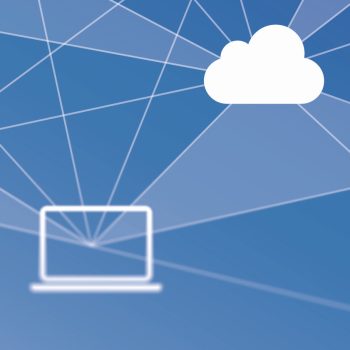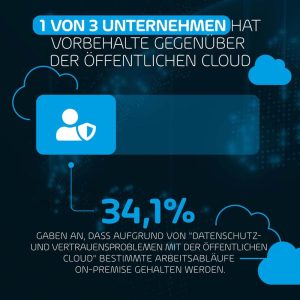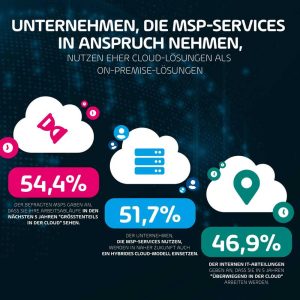
A survey conducted by Hornetsecurity shows that hybrid cloud solutions are a long-term goal for 2 out of 3 companies. In order to maintain on-premises infrastructure, a small proportion of respondents cited the need for full control over their data.
A hybrid cloud adoption and implementation survey of more than 900 IT professionals in North America and Europe, among others, found that the majority of organizations (93%) are using or within a mix of cloud and on-premises solutions migrate fully to the cloud in the next five years. Half of respondents (51%) said they will be working mostly in the cloud in five years, with one or two jobs still needing to be done on-prem. Conversely, 28% of respondents said they will remain “mostly on-prem,” with only one or two jobs in the cloud.
67 percent see the hybrid cloud as a long-term goal

Hornetsecurity: Survey on the acceptance and implementation of hybrid clouds (Image: Hornetsecurity).
While 29% of respondents said they are using hybrid cloud solutions as a stepping stone to a full cloud environment, 67% of respondents view hybrid solutions as a long-term goal for their infrastructure as some operations must continue to run on-prem. The rest say they are 100% sticking with an on-premises model. When asked about the reasons for maintaining a full on-premises infrastructure, these respondents cited the need for full control over their data, security concerns, and cost considerations associated with cloud services.
Cloud solutions: 34 percent of companies have trust issues
The Hybrid Cloud Adoption and Implementation Survey also found that organizations of all sizes often have trust issues associated with public clouds. 31-36% of all companies surveyed reported concerns here.
The survey also shows that mistrust of the public cloud increases with experience. Respondents with 20+ years of experience were more likely to express concerns about the trustworthiness of cloud platforms (34%) than those with 1-5 years of experience (24%). Half of all respondents cited legacy systems or software as another key reason for requiring certain work to remain on-prem, while “application compatibility” was a barrier to cloud migration for 4 in 10 companies. Industry regulations like GDPR, HIPAA, and CMMC were also cited as a barrier to cloud adoption by 29% of respondents.
Challenges block cloud implementation

Often combined: MSP services and cloud solutions: survey on the acceptance and implementation of hybrid clouds (Image: Hornetsecurity).
Organizations said they refrain from full cloud migration because of a lack of “technical expertise or certified staff” (48%) or difficulties in “applying best practices across the organization” (33%). , and fear problems with connectivity (33%) and “secure access” (29%).
The most common jobs that prevent IT departments from moving all services to the cloud are printing and imaging services (55%), according to respondents. Databases (50%), file storage (45%) and application services (43%) are also cited as reasons for staying partially on-prem.
Hornetsecurity's survey shows that hybrid cloud solutions still pose some challenges. “Surveillance and security” comes first, with half of those surveyed expressing concerns. “Network and connectivity” is another concern shared by almost half of all respondents (48%). The items "training and certification" (35%), "manageability and tools" (35%) and "reliability and data recovery" (33%) are also seen as problematic by the respondents.
Often combined: MSP services and cloud solutions
47% of respondents belonging to internal IT teams said they see their jobs “mostly in the cloud” in five years. This compares to as many as 52% of respondents whose organizations use MSP services and 54% of respondents who work at MSPs. However, internal IT departments report a lack of trust in cloud services almost as often as those using MSP services (34% and 33%, respectively).
More at Hornetsecurity.com
About Hornetsecurity Hornetsecurity is the leading German cloud security provider for e-mail in Europe and protects the IT infrastructure, digital communication and data of companies and organizations of all sizes. The security specialist from Hanover provides its services via 10 redundantly secured data centers around the world. The product portfolio includes all important areas of e-mail security, from spam and virus filters to legally compliant archiving and encryption, to defense against CEO fraud and ransomware. Hornetsecurity has around 200 employees at 12 locations around the world and operates with its international dealer network in more than 30 countries.
